January 18, 2011: The Day The Internet Went Dark

by Paul Arnote (parnote)
January 18, 2012. The day the Internet went dark.
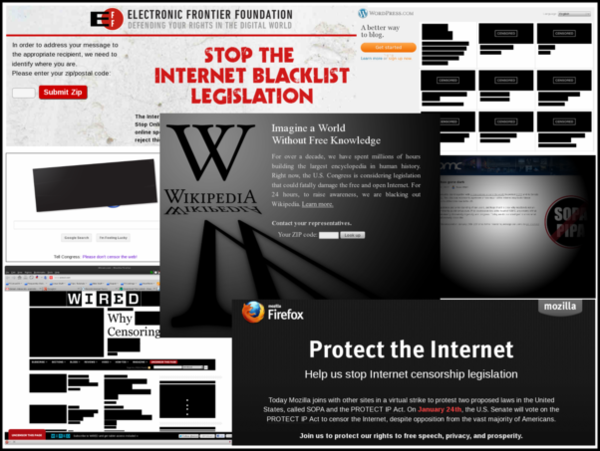
Some of the more notable participants in the fight opposing SOPA and PIPA during the Internet blackout campaign (from top to bottom, left to right): Electronic Frontier Foundation, WordPress, Google, Wikipedia, XBMC, Wired and Mozilla.
No more Wikipedia. No more Google logo on the Google home page. Wordpress … censored. Lights out on Mozilla. The Electronics Frontier Foundation, fighting for our digital freedom. Wired … unwired and censored. XBMC gone dark. Symbolically, at least for one day.
Even the web site of our own Patrick Horneker redirected to an “Internet Goes On Strike” page to show opposition to the proposed SOPA and PIPA bills now up for consideration before the U.S. Congress.
Most conspicuously absent from participation among those websites and content providers opposing SOPA and PIPA were Facebook and Twitter. The CEO of Twitter publicly announced his opposition to participating in the blackout, citing that it did not make good sense on a global business scale to black out the Twitter site. (I wonder who would cry foul loudest if Twitter became a victim of the type of Internet censorship that SOPA and PIPA would impose). My wife was able to effortlessly log into her Facebook account, without any mention of the blackout or either bill.
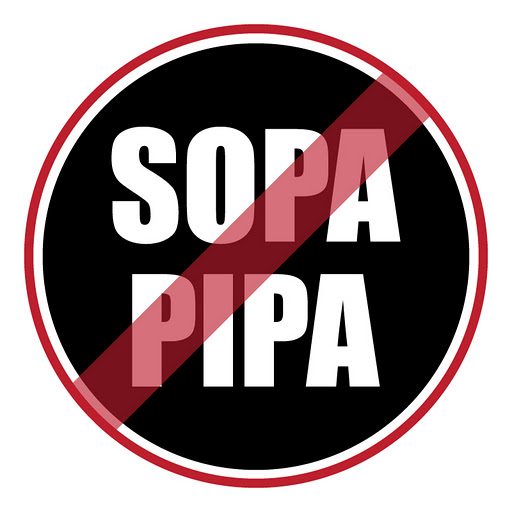
Just in case you’ve just awoken from a LONG hibernation, here’s a brief – and informal – explanation of what’s going on. (If you want a more concise and better explanation, watch this video.)
Since before Christmas 2011, the proposed SOPA and PIPA bills have caused a fever-pitched fervor and outrage among those who have embraced the Internet and the digital realm. The bills were put forth by special interest groups – the same people who distributed LimeWire, cNet downloads, iMesh, Napster and other file sharing applications – to prevent the piracy of their intellectual property. These same companies, largely backed by the MPAA and RIAA, are the record companies and movie studios, among other digital content creators.
So, a few members of the U.S. Congress and Senate took up their pleas, drafting horrible legislation (probably the worse legislation ever drafted in the history of the U.S. legislature) to protect those intellectual property rights – by penalizing web content providers, and shutting down web sites who are even suspected of copyright infringement, all without the due process of law that is protected by the U.S. Constitution. Then they attempted to ram-rod the bills through their respective bodies of the legislature before the annual winter holiday break.
Not so fast!
Once tech companies, Internet service providers, web content providers, web search engines, and virtually anyone else who participates in the free exchange of ideas and knowledge over the web got wind of these bills, the fight was on like Donkey Kong. Largely ignored by the mainstream media (after all, virtually every one of their parent companies support SOPA and PIPA), there has been exceptionally little in the daily U.S. news about these bills. That is, until January 18, 2012.
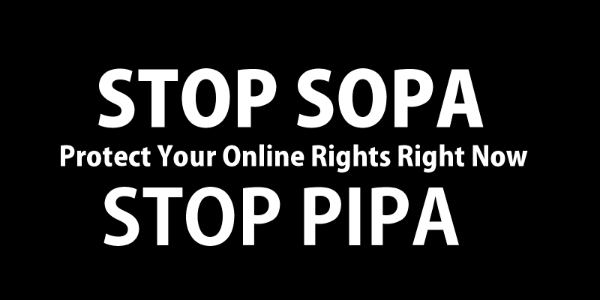
With literally thousands of websites participating in the blackout, either by completely blacking out their website for the day as Wikipedia did, or by obliterating key parts of their website as Google, Wordpress and Wired did, the mainstream media had no option but to cover the story.
Repeatedly, in virtually every story that appeared on the mainstream medias’ websites, you saw the disclaimer that their parent companies were ardent supporters of SOPA and PIPA. Even though you had to search the web page to find the coverage of the unified Internet blackout move (it was usually buried in the “other news of the day” category), there was indeed coverage. In fact, on the MSNBC news site, the video about the Internet blackout was, by the website’s own counter statistics, the most watched news story of the day. On the CBS News website, they offered up a public poll simply asking, “Should SOPA and PIPA be passed?” The results were no surprise: 97% said no, 1% said yes, and 2% were undecided.
Throughout the day, many key members of the U.S. Congress withdrew their support from the two bills, presumably due to the outcry from their constituents. I know that I signed every petition I came across during the day on January 18, 2012 that voiced opposition to SOPA and PIPA. Attempts to log into the home pages of my two U.S. Senators on the U.S. Senate website resulted in errors, as the Senate web servers were worked beyond capacity and overloaded. However, I was able to get into the email comment page of my U.S. Representative (Missouri 5th District), and I left him the following email:
PLEASE show your support for an open and free Internet by voting NO on SOPA and PIPA. The Internet has historically been about free and open exchange of ideas and knowledge. Both of these bills, if enacted, would gut the Internet of these ideals and principles. In the past, the U.S. has been harshly critical over other countries who restrict access by their citizens to a free and open Internet (most notably The People's Republic of China, and Egypt during the recent demonstrations for government change there). Under SOPA and PIPA, the United States will join them in curtailing free and open access to the Internet to its citizens.
While I can see some importance in protecting intellectual property rights, SOPA and PIPA go way too far, with far too heavy of a hand. The Internet, if it is to survive, must do so without encumbrances of legislation by ANY country, and free and unfettered access to the Internet, by those who wish to access it, should be allowed. Legislation is NOT the way to protect intellectual property rights; rather, let the makers of those goods find other methods (e.g., the marketplace and technology) to protect IP rights.
Please, do not allow SOPA and PIPA, which cater only to special interest groups, to pass.
Thank you for your time.
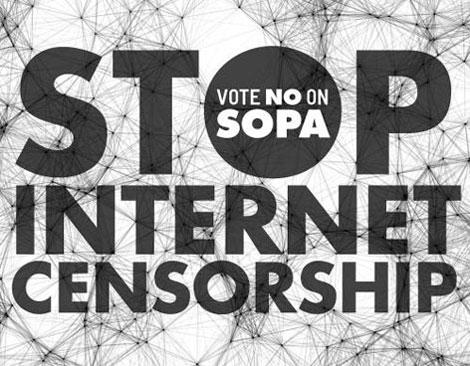
The fight is just beginning. Those who are ever vigilant about fighting for Internet freedom and keeping government regulations and legislation from oppressing a free and open Internet must not let their guard down. There will be other attempts in the future by governments world wide to regulate the Internet. Spain was the latest casualty in this fight, bowing to pressure from the U.S. to pass anti-piracy legislation with very similar wording to SOPA and PIPA. The governments of the world seem to not be able to just stand by idly without their paws and fingers dipping into an unregulated, free flowing river of ideas and knowledge that the Internet represents.
Perhaps the temptation to extend their influence of power is just too great. Perhaps they are fearful of a well informed constituency. After all, knowledge is power, and they’ve spent untold fortunes in their attempts to “dumb down” society. Plus, it is much easier to rule over an uneducated, ignorant and dumb populace.
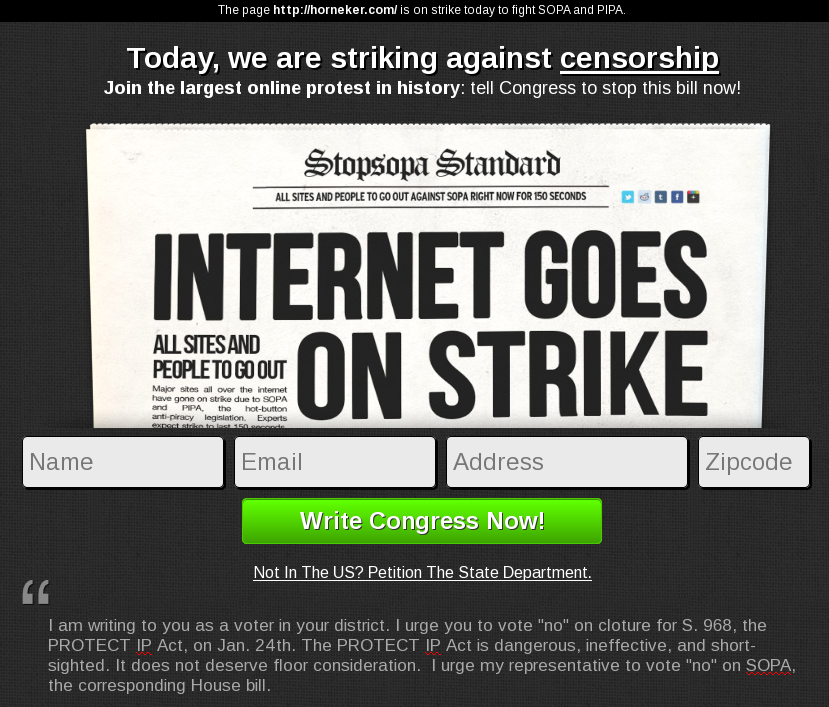
Update: It appears that the protest was successful – at least for now. U.S. Congressman Lamar Smith has withdrawn the SOPA bill, and for all intents and purposes, PIPA is also dead in the U.S. Senate, dying a deserved death in committee.
Former U.S. Senator and current head of the MPAA Christopher Dodd expressed surprise at how the widespread world-wide outcry against these bills “changed the game.” He, along with his entertainment industry cronies, thought that they were going to be able to shove these bills through Congress and garner an easy victory, without hardly anyone noticing.
Also playing a hand in the defeat of SOPA and PIPA was an announcement from the White House on Saturday, January 14, 2012. “While we believe that online piracy by foreign websites is a serious problem that requires a serious legislative response,” said the note, “we will not support legislation that reduces freedom of expression, increases cybersecurity risk, or undermines the dynamic, innovative global Internet.”
Although a clear message has been sent by Internet users, ISPs, etc. in regards to this attempt to regulate and censor the Internet, don’t underestimate the ability and desire of politicians to try again in the future. We must remain ever vigilant to preserve an open Internet, since it is often the only avenue available to a vast majority of the people of this world for an open exchange of knowledge, information and ideas.
They (the content providers, represented largely by the MPAA and RIAA) have “cried wolf” before, claiming that technological advances that came down the pipe were “going to ruin Hollywood” or “going to ruin the music industry.” They did this with cassette tapes, home video tape recorders, home DVD players/recorders, MP3 players … the list goes on and on. It seems that every time a new technology gains popularity, they go running off in fear to legislators, seeking a preemptive legislative cure. Yet, in every one of the previously cited instances where they feared that their respective industries were going to be “ruined,” their total sales and profits only increased. You would think that we’ve become accustomed to their mentality by now.
Somewhere down the line, in the not-too-distant future, another politician, bathed in the same motives as Representative Lamar Smith, will bow to the content providers’ special interest group and yet another run in fear from yet another technological advance, and attempt to re-introduce a legislative “cure” for their perceived ills. An even scarier proposition is that some underhanded, less-than-scrupulous politician will attempt to sneak an amendment into another, unrelated bill (like an emergency funding bill or another bill to raise the country’s debt limit), that will largely go unnoticed – until it’s too late.
With this being an election year, let’s hope that the voters can break from their typically myopic memories and vote the supporters and authors of these bills out of office.
We, the users of the Internet and the citizens of this world, must remain on guard. It is up to us to protect and fight for a free and open Internet.